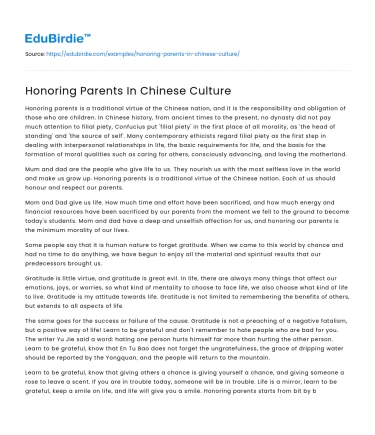Introduction
In Chinese culture, honoring parents is not merely a societal expectation, but a deeply entrenched value that permeates every aspect of life. This cultural tenet, rooted in Confucian philosophy, emphasizes filial piety—an ethical framework that dictates a moral duty towards one's parents and ancestors. Filial piety, or "xiao," is considered a fundamental virtue and is central to the familial and social structure in China. It is a concept that underscores respect, care, and obedience towards parents and elder family members, reflecting broader societal norms that value hierarchy and collectivism. This essay explores the cultural, historical, and social dimensions of honoring parents in Chinese culture, examining how this age-old tradition manifests in contemporary society. By delving into specific practices, real-life examples, and scholarly insights, we aim to illuminate the enduring significance of this cultural cornerstone.
Cultural and Historical Roots of Filial Piety
The concept of filial piety in Chinese culture is deeply intertwined with the teachings of Confucius, the renowned philosopher whose ideas have shaped Chinese ethical and social systems for over two millennia. Confucius emphasized the importance of family as the nucleus of society, advocating for respect and duty towards one's parents as a primary virtue. This notion is encapsulated in the Confucian text "The Analects," where Confucius states, "The filial son, when his parents are alive, serves them according to propriety; when they are dead, he buries them according to propriety and sacrifices to them according to propriety."
Save your time!
We can take care of your essay
- Proper editing and formatting
- Free revision, title page, and bibliography
- Flexible prices and money-back guarantee
Historically, filial piety has been institutionalized through various practices and rituals, such as ancestor worship and family reverence. Ancestor veneration is a testament to the belief that familial obligations extend beyond the living, reinforcing a sense of continuity and connection with one's lineage. This practice is not only a religious or spiritual duty but also a social one, as it fosters a collective memory and identity.
Moreover, the legal and political systems of ancient China reinforced filial piety. The Tang and Song dynasties, for instance, codified filial piety into law, wherein failure to adhere to filial duties could result in severe penalties. Thus, honoring parents was not only a moral obligation but a legal one, intertwining personal virtue with public duty. This historical backdrop underscores the profound influence of filial piety in shaping Chinese cultural identity.
Manifestations in Contemporary Chinese Society
In modern times, while the manifestations of filial piety may have evolved, the core values remain deeply ingrained in Chinese society. The rapid urbanization and modernization of China have introduced new challenges to traditional familial structures, yet the essence of honoring parents persists. One prominent example is the Chinese tradition of "living together" or "nearby" living arrangements, where adult children reside with or close to their aging parents to provide care and support.
Additionally, the observance of festivals such as the Qingming Festival, also known as Tomb-Sweeping Day, underscores the enduring relevance of filial piety. During this festival, families gather to clean and honor the graves of their ancestors, reflecting a continued reverence for familial ties across generations. This cultural practice highlights the interconnectedness of past, present, and future within the Chinese familial framework.
However, contemporary challenges such as increased mobility, career demands, and changing social norms pose questions about the sustainability of traditional filial practices. Critics argue that the pressures of modern life can lead to a dilution of filial obligations. Nonetheless, many Chinese families strive to adapt these values within the context of contemporary realities, employing digital communication and financial support as modern expressions of filial duty.
Counter-Arguments and Cultural Resilience
While the importance of filial piety in Chinese culture is widely recognized, it is not without its critics. Some argue that the traditional emphasis on filial obligations can lead to undue pressure on individuals, particularly the younger generation. The expectation to prioritize family needs over personal aspirations can create conflicts, particularly in a rapidly globalizing world where individualism is increasingly valued.
Furthermore, the traditional gender roles associated with filial piety, which often place a heavier burden on female family members, have been subject to criticism in the context of contemporary gender equality movements. As society progresses, there is a growing discourse on redefining filial responsibilities to accommodate changing social dynamics.
Despite these challenges, the resilience of filial piety as a cultural value is notable. Many Chinese people continue to uphold these traditions, finding innovative ways to balance modernity with tradition. The adaptability of filial piety reflects its deep-rooted significance and the cultural emphasis on harmonious family relationships, which remain a cornerstone of Chinese society.
Conclusion
In conclusion, the tradition of honoring parents in Chinese culture is a multifaceted construct that has evolved over centuries yet remains a vital aspect of Chinese identity. Rooted in Confucian philosophy, filial piety underscores a societal framework that values respect, duty, and familial harmony. Despite the challenges posed by modernization and changing social norms, the core principles of filial piety continue to influence Chinese familial and social dynamics. By examining both historical and contemporary practices, as well as addressing counter-arguments, this essay highlights the enduring relevance of filial piety in Chinese culture. It is a testament to the strength and adaptability of cultural traditions in navigating the complexities of modern life, ensuring that the essence of honoring parents remains a guiding principle for future generations.






 Stuck on your essay?
Stuck on your essay?

